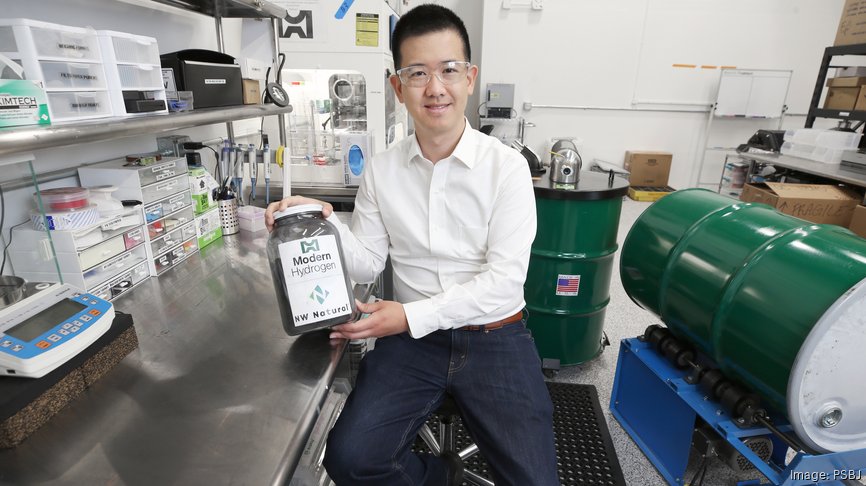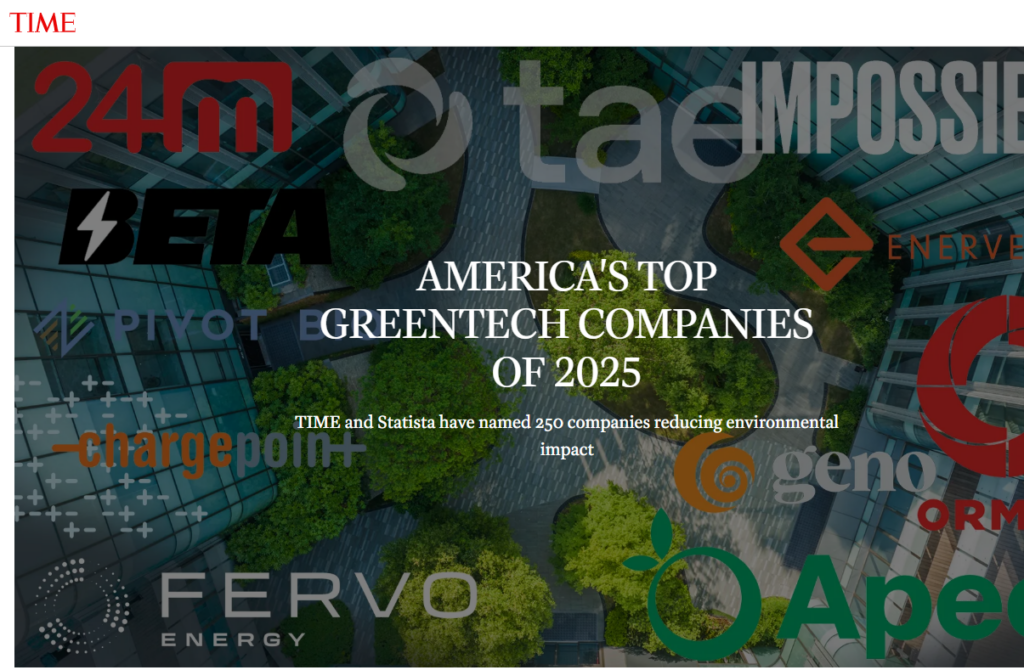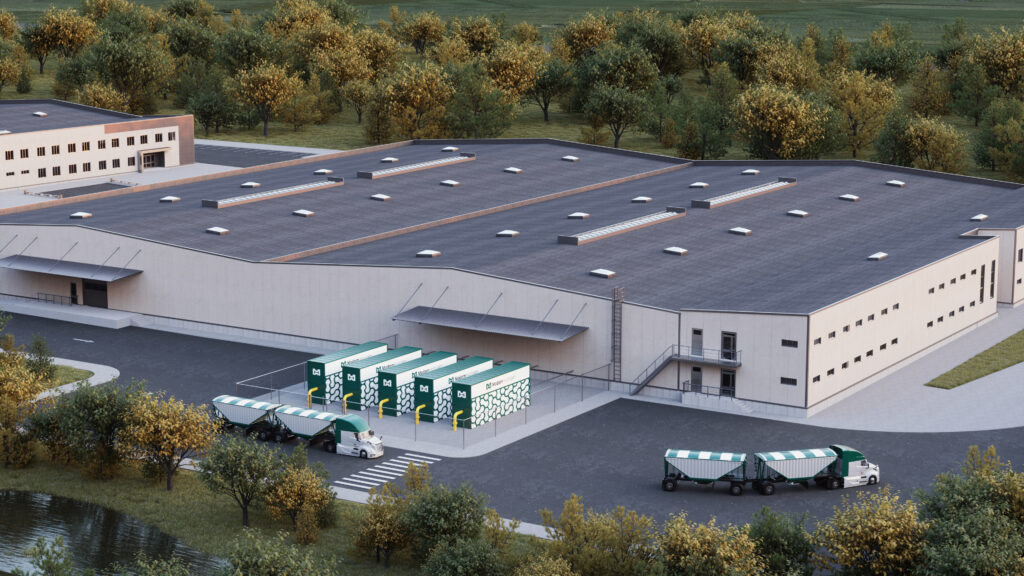Newsroom

Why Modern Hydrogen backs its model despite policy turbulence
GasWorld and H2 View Reporter Charlie Currie hears how the firm is betting on decentralized hydrogen production, solid carbon by-products and long-term customer planning to weather political uncertainty.
For all the political uncertainty unfolding in the US right now, Washington state-based Kai Moncino and his employer Modern Hydrogen are surprisingly relaxed.
In a nation and sector seemingly overcome by unpredictability, the Senior Manager of Product and Strategy presented a grounded, pragmatic business model that could sidestep many of the pain points facing other clean hydrogen players.

2025 Environmental Sustainability for Individual Leadership Award Goes To Tony Pan
Decarbonizing heavy industry is going to require technological breakthroughs, but Tony Pan doesn’t think it should require all-new infrastructure.
The company he co-founded in 2015, Modern Hydrogen, plans to deploy its first utility-scale device in 2025, using methane pyrolysis technology to separate natural gas into hydrogen for sustainable energy and solid carbon, rather than allowing it to be released into the atmosphere. And its secret sauce — it plugs directly into its customers’ existing networks of natural gas pipelines.
“This is a pivotal step in our mission to make a significant impact on climate change, proving that sustainable solutions can be practical and transformative,” Pan told the Business Journal.
Tony Pan
Individual Leadership
Title: Founder and CEO
Company: Modern Hydrogen
Headquarters: Woodinville
Washington employees: 100
Select sustainability stats:
250+: patents submitted by Pan for energy, climate, nanotechnology and biomedical devices.
500: kilograms of hydrogen each MH500 device can produce per day
Why is sustainability important to you?
Two reasons. One is: deep in the fiber of my being, I’m a huge nature person. Protecting the biodiversity of the planet and making sure the awe and grandeur of nature is there for future generations to enjoy is one my most cherished beliefs.
The other is that energy is the foundation of human civilization. I’m a physics person by background. The whole point of the industrial revolution, where lifespans and education increased tenfold, it’s because energy production increased 100-fold. It’s the basis for modern life. We can’t go back on that. We need all this energy to make sure we can keep advancing human civilization. A lot of the world still doesn’t have access to what we have in the U.S., but at the same time we’re baking the planet. It was very clear to me from a decade ago, if you study physics and history like I have that one of the most important things for the advancement of human civilization is tackling sustainability and climate change.
Modern Hydrogen was born from the idea that we can provide both clean hydrogen and clean solid carbon to be used in industry. We achieve this by decarbonizing natural gas at the customer site, leveraging the millions of miles of gas infrastructure already in the ground, avoiding the need for society to spend trillions on new infrastructure and reducing CO2 emissions on a massive scale.
What innovative solutions has the company developed to tackle sustainability challenges?
Modern Hydrogen plans to expand its decentralized hydrogen systems, which are crucial for utilities. This localized production eliminates costly, energy-intensive hydrogen transportation, making it a game-changer for industries and heavy transport that struggle to decarbonize. Our goal is to decarbonize the natural gas grid globally. Achieving this could reduce CO2 emissions by up to 10 gigatons annually — four times the emissions from the entire airline and shipping industries combined.
There is a set of problems for energy you can solve with renewable electricity. Solar panels are more than 50 years old and they’re cheap enough to be deployed for lots of use cases. If it can use renewable electricity or nuclear, people have figured it out. Since electricity has been solved in mass manufacturing, what’s the next thing to be solved? There are things that are hard to electrify. Electricity is less than a third of our total emissions. You need to add new technologies that can tackle things that can’t be electrified. Hydrogen is the holy grail for replacing traditional combustion fuel. This is about skating to where the puck is. That’s going to leave a huge swathe of need and opportunity, and hydrogen is a good candidate. The innovation is driven by lots of smart people at Modern, supported by brilliant and – frankly — patient investors like Bill Gates and NextEra who took a leap of faith to try a new technology with us.
What actions have you taken to educate others about the importance of sustainability?
Outside of work, (I am) dedicated to education and exploration of the future of sustainability. (I am) an inventor who has 250+ patents pending in energy and climate, nanotechnology, and biomedical devices. (I am) a member of Global Future Councils of the World Economic Forum and a pro bono consultant on global health for the Bill & Melinda Gates Foundation, and Global Good Fund.
How does your personal commitment to sustainability manifest in your daily life and work?
As the global push for cleaner energy intensifies, the company’s technology will play a critical role in reducing carbon emissions while creating new industries around hydrogen and solid carbon products. Reducing emissions isn’t just about mitigating climate change. It’s about creating jobs, fostering innovation and winning the industries of the future for the next generation. Our mission is to make energy cleaner and cheaper for all.

Strengthening American energy independence with natural gas pyrolysis
Data centers, manufacturing and infrastructure expansion require scalable solutions that strengthen U.S. energy independence. However, utilities struggle to meet rising demands quickly.
Energy needs are surging, with U.S. electricity demand projected to rise by 128 GW in five years — a 456% jump from previous estimates — driven by AI, advanced manufacturing and reshoring. Data centers and industrial operators require stable, cost-effective power, making it essential to leverage domestic energy resources.
Modern Hydrogen is a natural gas solutions provider for industrial operations and heavy-duty mobility. The company’s natural gas pyrolysis technology provides a practical solution, producing hydrogen on site while capturing solid carbon for infrastructure use. This strengthens grid resilience, lowers costs and supports energy security without costly transmission buildouts or reliance on foreign energy.
Unlike green energy projects that require heavy subsidies and infrastructure overhauls, natural gas pyrolysis offers a scalable, cost-effective alternative. It utilizes abundant American natural gas to generate hydrogen while repurposing captured carbon for roadwork, enhancing infrastructure and ensuring long-term energy reliability.
Case study: On site hydrogen generation for data centers
Modern Hydrogen and Mesa Natural Gas Solutions have partnered to deploy the pyrolysis technology for data centers. The Modern Hydrogen system will produce hydrogen onsite to supply Mesa Solutions’ hydrogen-powered generators with a stable fuel source. This partnership model provides a near-term energy solution while supporting long-term, scalable development.
Case study: Meeting decarbonization demands and boosting efficiency
Industrial heating is critical to American manufacturing. Cambridge Air Solutions in collaboration with Modern Hydrogen, announced it is planning to integrate hydrogen from Modern’s pyrolysis into ultra-high efficiency HVAC systems used by companies like General Motors. Cambridge Air’s technology boosts efficiency and reduces operating costs, ensuring manufacturing remains competitive and meets customer driven decarbonization demands without requiring expensive new infrastructure.
Rather than treating carbon as waste, Modern Hydrogen converts it into a high performance asphalt additive. Already in use across six states, this American-made material strengthens roads, highways and runways while reducing reliance on foreign sourced materials. Monetizing carbon for infrastructure investment creates new revenue streams from natural gas.
Modern’s natural gas pyrolysis delivers key benefits, enhancing American energy security by utilizing domestic natural gas while reducing dependence on foreign energy sources. It strengthens infrastructure by capturing carbon for road construction, lowering maintenance costs. Additionally, it offers a cost-effective alternative to expensive electrification projects, reducing business costs and driving investment in natural gas innovation.
Industries need reliable, cost-effective energy solutions that support American businesses and communities. Natural gas pyrolysis ensures U.S. energy independence while bolstering sectors like AI, manufacturing and transportation. By leveraging domestic resources, this technology reinforces economic stability and secures the nation’s energy future.
As a groundbreaking American energy innovation, natural gas pyrolysis strengthens industries, drives economic growth and supports energy independence. By producing hydrogen at the point of use, companies can provide affordable, reliable energy while creating a productive use for solid carbon in infrastructure. As industries expand, this technology will be critical to ensuring a secure and prosperous energy future.

Bill Gates’ carbon-sequestered asphalt hits the road
ust over 12 months ago, billionaire philanthropist Bill Gates was all smiles as he visited the head office of Modern Hydrogen in Seattle, Wash., one his more successful environmental technology startups. Although looking a bit awkward wielding a shovel and wheelbarrow, Gates managed to pack a load of asphalt into a test pothole.
The asphalt mix was made from a solid material that Modern Technology captures from natural gas and permanently embeds into carbon-sequestering asphalt. They call it Modern Carbon.
“One year later, the pothole patch is holding up perfectly,” says Michael Baba, senior product development manager at Modern Hydrogen. “It’s been taking daily traffic with no issues — and frankly, it just looks like a regular part of the road. It’s dirty, it’s unremarkable, and that’s exactly what you want from good asphalt.”
As reported by the Daily Commercial News, Modern Hydrogen was created in 2015 with the help of Gates. Their proprietary technology involves a methane pyrolysis reactor that strips carbon from natural gas (methane) right at the meter or from fossil fuels or biogas from sources like manure and produces pure hydrogen fuel that releases only water vapour as a byproduct.
One key component that can be produced from this is a solid carbon that, without extra processing, can be incorporated as an ingredient in asphalt, replacing the typical bitumen used to bind the sand and gravel. This results in reduced GHGs, locked-in carbon and what Modern Hydrogen claims are up to 20 per cent in cost savings.

America’s Top GreenTech Companies of 2025
Modern Hydrogen named one of America’s Top GreenTech Companies of 2025 by TIME Magazine.
Methodology: How TIME and Statista determined the top greentech companies of 2025
Each year the impacts of climate change are felt more acutely, but so are the contributions of a growing number of greentech innovators. The United States’ best sustainable solutions don’t just strive to replace the wasteful with the less so; they’re changing how we operate as a society, developing innovative and commercially viable solutions that also have a positive environmental impact.
This year, TIME once again partnered with Statista to rank the 250 top sustainability focused companies in the U.S. The analysis considered the positive impact, financial strength, and innovation of organizations that are developing products, services, or technologies to stop or reverse the impact of human activities on the planet.
Top ranked BETA Technologies, for example, is seeking to reinvent flight with its fleet of battery-powered planes. The Vermont-based company has developed conventional and vertical take-off aircrafts that can transport 5 passengers or 200 cubic feet of cargo plus a pilot 336 nautical miles on a single, hour-long charge. The result is a flight that costs a fraction of a typical ride in a small plane or helicopter, with 75% to 84% less emissions.
While BETA is primarily focused on short flights, it won’t be long before battery capacity reaches a point that enables emissions-free overseas travel. The company has already signed deals with Air New Zealand, UPS, Amazon, the U.S. Air Force, and the U.S. army, with a backlog of more than 600 orders.
Three of this year’s top 10 are also reimagining our approach to food. In second place, Apeel repurposes organic materials, like the leftover grape pressings from wineries, to create an invisible, tasteless wrap that keeps food fresh longer. Apeel founder and CEO James Rogers told TIME in 2018 that “we can draw inspiration from the natural world” and use “food to preserve food.”
Many companies on the list focus on renewable energy, including two in the top 10 that use geothermal energy: Fervo Energy and Ormat. Despite its popularity abroad, the 120-year-old green energy solution has yet to be widely adopted in the United States due to its geographical limitations and historically higher cost than more polluting alternatives.
But in Utah in September 2023, Fervo broke ground on what it says will be the world’s largest geothermal plant, which will begin to deliver carbon-free electricity to the grid next year, and reach its full 400 megawatt capacity in 2028. “Technologies like this only make a difference if we deploy them at large-scale in a way that can reduce carbon emissions and increase the reliability of the grid,” CEO Tim Latimer told TIME in 2023.
America’s top greentech companies are seeking to reinvent industry, forcing us to consider better, cheaper, and ultimately more sustainable alternatives to traditional approaches. —Jared Lindzon

Puget Sound Energy, Modern Hydrogen Partner to Deliver ‘Clean Hydrogen’
Puget Sound Energy has teamed up with clean-energy supplier Modern Hydrogen to develop a new low-emissions approach to creating hydrogen for use in the commercial and industrial sectors, PSE said in a press release.
“PSE is undergoing the most significant transformation in our history as we strive to meet Washington state’s clean-energy laws—some of the most ambitious in the nation,” said Josh Jacobs, PSE vice president of energy strategy and planning. “Our partnership with Modern Hydrogen is a significant step towards achieving this vision, as their technology has the potential to help our largest gas customers accelerate their decarbonization programs and reduce their greenhouse gas emissions.”
Modern Hydrogen and a growing number of climate-tech startups are exploring a new method of creating hydrogen, called clean hydrogen, that diverts from the more common green hydrogen—which employs electrolysis using clean electricity to split water into hydrogen and oxygen.
Green hydrogen has been popularized over the last several years as a low-emissions fuel aimed at helping commercial and industrial sectors transition away from fossil fuels.
However, the current unprecedented electricity demand presents a problem for using electrolysis, said Michael Jung, director of government affairs and public policy at Modern Hydrogen.
“Right now, it’s [artificial intelligence] data centers versus green hydrogen electrolyzers competing for the next electron on the renewable side of the grid,” Jung told Clearing Up.
Green hydrogen production is governed by the American Clean Power Association’s three pillars: time-matching, additionality and regionality, which David Brown, founder and CEO of Oregon-based Obsidian Renewables, says makes the production of green hydrogen economically unviable.
Additionality requires that hydrogen production be powered by new clean-electricity sources to avoid diverting clean energy from other uses—excluding Washington and California, which are allowed to use legacy hydro, wind and solar power. Time-matching holds that the hydrogen production process must occur during the same hours that clean electricity is generating, ensuring that production isn’t subsidized by fossil fuels when clean energy is not available. Regionality requires the hydrogen production facility to be in the same region as the electricity source to limit grid congestion.
Additionality in particular makes Brown question the feasibility of electrolysis.
“To get a green hydrogen project going, you not only have to develop a green hydrogen project, but you also have to develop new wind and solar at the same time, and so now you’ve got a super complex development project,” Brown told Clearing Up. “If you’re building that new wind and solar, you’re going to sell it to a data center, you’re not going to sell it to a brand-new startup.”

BuiltWorlds Names Modern Hydrogen in Top 50 2025 Sustainable Jobsites
BuiltWorlds has just released its 2025 Sustainable Jobsites Top 50 List!
We’re highlighting the top technologies in Equipment Fuel Alternatives, ESG Compliance & Tracking, Waste Management, and Water & Electricity Utilities Tracking, as determined by 2025 Sustainable Jobsite Survey responses, direct industry research, member conversations and feedback, and case studies. Read the full list: https://builtworlds.com/…/2025-sustainable-jobsites…/
This list is particularly important as the role of technology has become pivotal to the industry’s evolving sustainability goals. And while our research shows overall improvement in that endeavor, with a majority contractors rating their ability to run sustainable jobsites as either “Good” (36.8%) or “Excellent” (21.1%). There is still room for improvement. A significant portion of contractors still rate their sustainability efforts as either “Fair” (31.6%) or “Poor” (7.9%).

Power Engineering: Modern Hydrogen, Mesa Solutions team up for on-site hydrogen power for data centers
Modern Hydrogen, a provider of distributed hydrogen production and carbon management, and Mesa Solutions, a provider of on-site power generation, announced a strategic partnership to deliver a “groundbreaking” clean power solution for data centers.
The two companies officially signed the partnership agreement on Tuesday at the POWERGEN International Conference in Houston, with Modern Hydrogen CEO Tony Pan and Mesa Solutions CEO Scott Gromer making joint announcements.
This solution allows data centers to deploy scalable, firm power solutions using every natural gas connection available — without depending on the grid.
By combining Mesa Solutions’ experience with multi-megawatt on-site power generation with Modern Hydrogen’s distributed technology for decarbonizing natural gas, the partnership aims to enable data centers to access scalable hydrogen power — without waiting for hydrogen infrastructure buildout or paying for costly delivery.

FCW: Modern Hydrogen and Mesa Solutions Partner to Deliver On-Site Clean Power for Data Centers
Industry leaders unveil collaboration to enable next-generation, reliable, and cost-effective hydrogen power generation from natural gas
Modern Hydrogen, a leader in distributed hydrogen production and carbon management, and Mesa Solutions, a premier provider of on-site power generation, today announced a strategic partnership to deliver a groundbreaking clean power solution for data centers.
The two companies officially signed the partnership agreement at 10:30 a.m. on Tuesday at the POWERGEN International Conference in Dallas. Modern Hydrogen CEO Tony Pan and Mesa Natural Gas Solutions CEO Scott Gromer made joint announcements.

Modern Hydrogen and Mesa Solutions Partner to Deliver On-Site Clean Power for Data Centers
Houston, TX—February 11, 2025—Modern Hydrogen, a leader in distributed hydrogen production and carbon management, and Mesa Solutions, a premier provider of on-site power generation, today announced a strategic partnership to deliver a groundbreaking clean power solution for data centers.
The two companies officially signed the partnership agreement at 10:30a.m. Tuesday at the POWERGEN International Conference in Houston, with Modern Hydrogen CEO Tony Pan and Mesa Solutions CEO Scott Gromer making joint announcements.

Mesa Solutions, Modern Hydrogen sign H2 MoU
Mesa Solutions, which specializes in natural gas or liquid propane-powered mobile generators and engines, and Modern Hydrogen, a provider of distributed hydrogen production and carbon management, announced the signing of a memorandum of understanding (MoU) at PowerGen International, Feb. 11-13, in Dallas, Texas, for development of a clean power solution for data centers.

Fuel Cell Works: Puget Sound Energy and Modern Hydrogen Forge Decarbonization Path with Innovative Hydrogen Technology
Puget Sound Energy (PSE), Washington’s largest utility, and Modern Hydrogen, a clean energy technology leader, today announced a strategic partnership to drive the adoption of advanced decarbonized technologies in support of meeting Washington state’s clean energy goals.
Modern Hydrogen’s innovative carbon removal technology enables large-scale CO2 emissions reduction in Washington’s most difficult-to-decarbonize commercial & industrial sectors. By joining forces, PSE and Modern Hydrogen will promote the development of distributed methane pyrolysis technology, a groundbreaking solution that removes carbon from natural gas at the point-of-use for commercial and industrial operations.
